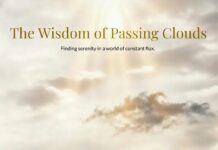Delusion Series, Part 23–The Dangers of Delusion
Hello, dear friends!Welcome to this episode of the podcast, brought to you by the Australia Buddhas’ Practice Incorporated.
Today, we continue our exploration of the dangers of delusion and the path to awakening through true wisdom.
1. The Dangers of Delusion: The Root of All Destruction
What is delusion? Delusion is false, unreal, and contrary to truth. It is characterized by its lack of order, its disregard for facts, and its chaotic, baseless nature. Delusion is terrifying because it silently infiltrates every aspect of our lives, destroying everything in its path.
- Undermining Physical Health
Take dietary habits, for example. People in Shanghai prefer sweet flavors, while those in Sichuan favor spicy ones. Long-term biased eating leads to an excess of certain nutrients and deficiencies in others. On the surface, it may seem fine, but over time, these imbalances accumulate, and illness erupts. This is the consequence of delusion—you think it’s harmless, but it plants the seeds of harm. - Disrupting Workplace Harmony
In the workplace, delusion causes you to misjudge situations, exaggerate facts, or indulge in unrealistic fantasies. These missteps lead to conflicts with colleagues, disrupt team harmony, and ultimately hinder your career progress. - Damaging Relationships
Delusion breeds prejudice and misinterpretation of others’ intentions. A fleeting suspicion can lead to misunderstandings with friends or family, even severing ties. The root of such relational breakdowns lies in delusion.
Delusion is the source of all failure and suffering. It acts like a malignant tumor, eroding your body, mind, career, and life. As long as delusion persists, success and peace remain elusive.
2. Truth and Wisdom: The Foundation of Success
In contrast to delusion is truth. What is truth? Truth is the way things are—unembellished, unaltered, and precise. Thinking rooted in truth is wisdom, which adheres strictly to facts and follows clear principles step by step.
Consider cooking as an analogy. A master chef creates delicious dishes not through magic but by strictly adhering to the truth: preparing all ingredients, controlling the heat precisely, and timing each step perfectly. If they indulge in delusions like “cooking one minute less will save time” or “adding extra salt will taste better,” the dish will inevitably fall short or become inedible.
Similarly, success in any endeavor relies on truth. In the TV series Nirvana in Fire, the character Mei Changsu excels in strategy because he bases his judgments on the personalities, habits, and behaviors of others, relying on facts and logic rather than assumptions. Yet even he once faltered due to a delusion—misjudging the whereabouts of the princess—leading to a critical error. This shows that even a single delusion can derail us. By rejecting delusion and adhering to truth, we pave the way to success.
3. How to Awaken to the Dangers of Delusion
Since delusion is so harmful, how do we awaken to its nature and break free from its grip? Here are key steps:
- Recognize the Illusory Nature of Delusion
Delusion is unreal, like the reflection of the moon in water or a flower in a mirror—seemingly present but intangible. For instance, one might assume “this knife is made of iron,” overlooking the differences in iron content between knives. True wisdom lies in deeply investigating the essence of things and understanding their precise details. - Observe the Mechanics of Delusion
Delusion is not random; it can be traced. Train yourself to observe how delusions arise, how they operate, and what they lead to. Through repeated observation, you’ll realize that delusions often stem from habitual thinking patterns rather than the reality of the present moment. - Cultivate Deep Aversion to Delusion
To truly break free from delusion, you must develop a profound aversion to it. Just as you wouldn’t touch, taste, or treasure dog feces on the road, once you recognize that delusion brings only pain and failure, you’ll naturally steer clear of it. This aversion isn’t instantaneous—it requires consistent observation and awakening. - Act According to Rules, Not Delusions
Buddhism teaches that pure wisdom is free from delusion. When acting, follow rules and facts, not emotions or fantasies. For example, when faced with a problem, calmly analyze the facts and solve it systematically, rather than acting on impulsive guesses.
4. Practice: From Awakening to Liberation
Awakening to the dangers of delusion is only the first step. The key is to integrate this awareness into daily life and practice liberation from delusion.
- Focus on the Present, Eliminate Distractions
When working, concentrate fully on the task at hand, free from delusional interference. In your free time, reflect on your delusions and afflictions, exploring their origins and effects. This practice will gradually reveal the illusory nature of delusion. - Act Contrary to Delusion
When a delusion arises, try doing the opposite. For instance, if you habitually worry about failure, remind yourself: “This is just delusion; I will act based on facts.” This counteraction can swiftly dissolve delusion’s power.
5. Conclusion
Dear friends, as Buddhism teaches, a pure mind unleashes boundless potential, and true wisdom brings lasting peace. Let us abandon delusion, embrace pure wisdom, and live a life of freedom and clarity. Thank you all!





